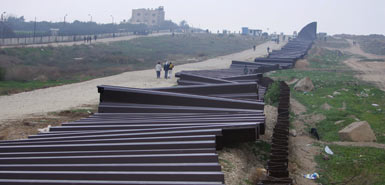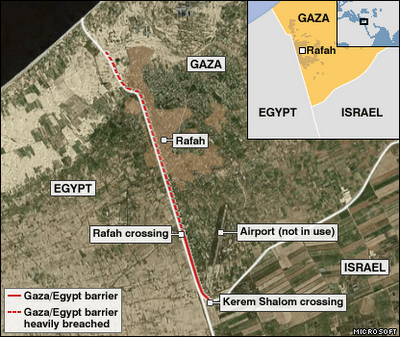ANALYSIS / Gaza raids met by loud silence from the Arab world
As the death toll in Israel Defense Forces raids against miltiants firing rockets from Gaza climbed to more than 60 on Saturday, Palestinian Information Minister Riad al-Malki responded by saying: "Hamas gave Israel an excuse to start a war in Gaza." Palestinian President Mahmoud Abbas also responded along these lines by saying that the "operation in Gaza is not just a reaction to the rocket barrage." Both comments can be interpreted as Palestinian backing of the Israel Defense Forces ground incursion in the Strip. |
Meshal's ultimate goal is to pull elements within Fatah and other Palestinian organizations to the armed struggle, even at the cost of starting a third intifada. So far, Meshal was unsuccessful in his attempts to garner pan-Palestinian support for Hamas' repeated use of Qassam rockets against Israel. Senior Palestinian and Arab officials voiced serious doubts concerning the rockets' efficacy, including several officials who condemned the use of Qassams as detrimental to the Palestinian cause. |
From Egypt's perspective, it is obvious. The breach of the Egyptian border with Gaza in January disrupted Egypt's territorial integrity, allowed thousand's of Gazan to enter Egyptian terrority, allowed many Al Qaeda elements into Gaza, and caused Egypt to mass troops in the area, especially at the Rafah crossing. Egypt, for its part, acted like Israel usually does in these circumstances. It re-established the border to contain the Palestinians, or more to the point to contain Hamas, an offshoot of the Muslim Brotherhood which Egypt is trying to quell in its own territory.
Israel, for its part, played with the idea of carving out part of the Negev Desert to give to the Palestinians and let Egypt supply Gaza from that point forward, completely ending any semblance of an occupied Gaza. The Egyptian government balked at this idea. Israel in effect, called Egypt's bluf.
Jordon, Syria, and Lebanon are silent as they do not want trouble in their own countries among the Palestinians living their in refugee camps.
Most importantly, all are silent because having been given their own territory, Hamas is still making trouble and not leading its people. Instead of establishing its own economy to help its own people, it just keeps up the struggle, it keeps firing rockets into civilian areas of Israel.
Just as Al Qaeda in Iraq is causing "intellectual turbulence" among muslims, Hamas is causing intellectual turbulence among Arab nations. Hamas has been given their own territory, and yet they continue to struggle. Fatah has been given a lot of control over the West Bank and is doing well. It is gaining more control everyday as it shows it can keep order. The economy of the West Bank is flourishing as a result.
Now that Palestinians are split, Arab countries have two examples of leadership. Fatah is doing rather well while Hamas continues to blame all its troubles on Israel. At this point, Arab nations are wondering why Hamas is still struggling when it has its own territory. In effect, Hamas is showing it cannot lead politically and can only struggle militarily.
This point gets back to the "intellectual turbulence" that is moving jihad from an external struggle back to an internal struggle. Fatah is undergoing an internal struggle as it tries to govern a people. Hamas is stuck in an external struggle even though it now commands its own territory.
All governments in the region do not want this crisis to begin a general war in the Middle East. Iraq appears to growing quieter. Lebanon is in crisis, but calm. The last thing Arab governments want is Hamas to cause increased crises in Lebanon and Iraq. For these reasons, they are all quiet.
Labels: Egypt, Fatah, Gaza, Hamas, Palestinians




